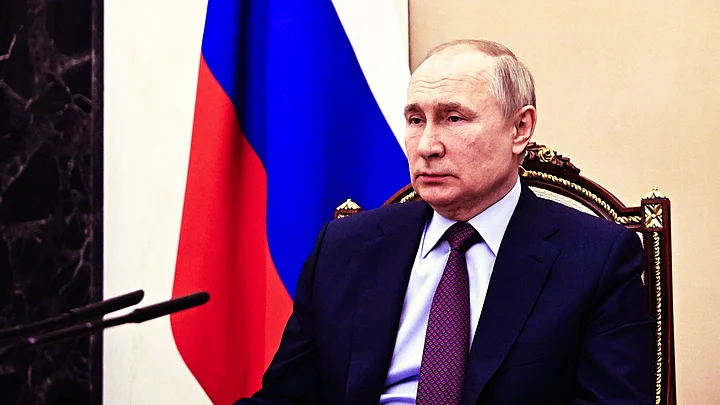The Russia-Ukraine conflict has many fronts. There is the Russian invasion of Ukraine and war, the current Ukrainian resistance led by President Volodymyr Zelenskyy, NATO and Russian tensions and the former’s sanctions on Russia, the diplomatic battle playing out at the United Nations and the chanceries of the world, and the information war for gaining favourable global perceptions.
Russia is doing poorly on all these fronts. Its military action is not unfolding as Russian President Vladimir Putin had anticipated. That is evident from his decision to up the kinetic action and bring in the nuclear dimension. These steps will only contribute to the impression that some sections of the western media are projecting to global public opinion that Putin is perhaps not all there. This is notwithstanding the fact that in strategic terms, the activation of Russia’s nuclear defence forces is a strong signal to the US and its NATO allies of Putin’s willingness to go up the escalation ladder.
'Putin's War'
The US and NATO leaders are trying to portray the Russian invasion as a decision driven solely by Putin. Hence, the war is being projected as Putin’s war. To show that the war has no popular support in Russia, small protests in some Russian cities are being played up. The US Permanent Representative to the United Nations, Linda Thomas-Greenfield, did so during the UN Security Council meeting on Ukraine on 27 February. Putin’s attempts to show that Russia’s National Security Council is fully behind him will cut no ice with global opinion-makers.
This focus on Putin as an irresponsible leader who is acting emotionally is likely to be intensified in the coming days diplomatically and in the media. It may resonate with people not only in Europe but elsewhere in the world, too.
Whatever sympathy there may have been for Putin for being gradually pushed into a corner by NATO ignoring his pleas for an acknowledgement of his country’s security interests has now disappeared because of the invasion of Ukraine.
The fact is that Putin crossed a red line by invading Ukraine. Such an action is unacceptable, especially in the advanced world, including in Europe, which has not seen an invasion since the Second World War. There has been violence and military action – in Northern Ireland, during the break-up of Yugoslavia, in Chechenia and on the fringes of the continent, in the Caucasus – but never has one European country, leave alone a nuclear power and a veto-wielding permanent member of the UN Security Council, invaded another country.
China and Russia
That has shocked Europe and the world. Whatever be the provocation, the act is unacceptable to almost all countries – not even China, which is now Russia’s close ally. China abstained from voting on a UNSC resolution criticising Russia on 24 February and again on 27 February. Clearly, it was distancing itself from Russia, which was left alone to exercise its veto. In its statement on 24 February, China spoke of the need to uphold the sovereignty and territorial integrity of states while acknowledging Russia’s security interests.
Interestingly, China dropped the reference to sovereignty and territorial integrity in its 27 February statement. That was a concession to Russia, particularly if it is seen in the context of China’s reference to Russia’s security needs.
On that, it said that the European Union (EU) and Russia should have discussions on European security to arrive at a “European Security Mechanism”, which would uphold the principle of indivisible security and would be “balanced, effective and sustainable”. Overall, however, the world will perceive that China left Russia alone in the UNSC, and that will feed Asian and global perceptions too.
The 'Brave' Resistance of Ukrainians
The western and global media are carrying live images of the Russian invasion of Ukraine. They are emphasising the “brave” resistance of the Ukrainian government and people. It is also showing Ukrainians fleeing to neighbouring countries. That is adding to the international ire against Putin. Such is the spread and power of Western media that the Russian narrative has simply no chance of getting through to global opinion.
Indeed, the Russian Permanent Representative to the UN lamented that Western media is “shamelessly” spreading lies by showing images of the destruction in Donbas by the Ukrainian army as the handiwork of Russian forces in the areas of Ukraine where they are present. There is simply no chance of such statements influencing anyone, for the images being carried by the Western media are much too graphic.
The fact is that the perception war is going against Russia. It does not have the means or the skills to match the West. This is besides the fundamental problem of its media managers having to “sell” the invasion as a justified response to Ukrainian and NATO provocation and their indifference towards Russia’s concerns.
In the days of the Soviet Union, there was support from sections of global opinion-makers because of the Soviet power and the ideological commitments of the believers of communism. Today, Russia does not have that comfort.
Russia, and in particular Putin, are in the dock of global opinion today.
(The writer is a former Secretary [West], Ministry of External Affairs. He can be reached @VivekKatju. This is an opinion piece and the views expressed above are the author’s own. The Quint neither endorses nor is responsible for them.)
